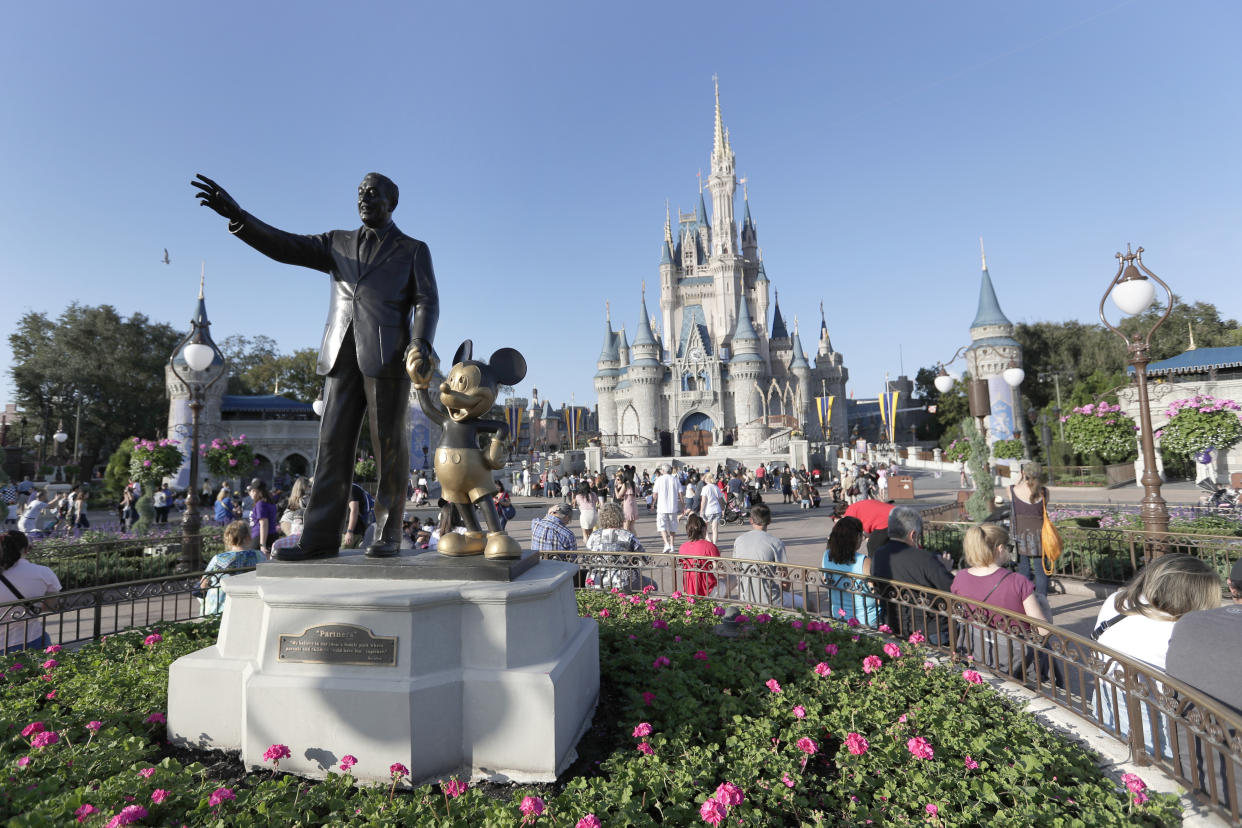Disney files appeal after federal judge dismisses company lawsuit against DeSantis
Disney (DIS) filed a notice of appeal on Thursday after a federal judge dismissed the company's free speech lawsuit against Florida Governor Ron DeSantis a day prior.
In a court order issued Wednesday, US District Judge Allen Winsor, who was appointed to the federal bench by former President Donald Trump in 2019, granted a motion to dismiss Disney's case.
The federal lawsuit, filed in April, alleged DeSantis and his hand-selected Central Florida Tourism Oversight District (CFTOD) board launched a "targeted campaign of government retaliation" to punish Disney for its opposition to the state's "Don't Say Gay" law.
The law, the Parental Rights in Education Act, forbids instruction on sexual orientation and gender identity from kindergarten through third grade.
The judge determined that Disney's position ultimately "lacked standing," or the right to sue Gov. DeSantis and a separate government official, and set forth failing arguments against state tourism board officials.
Following Windsor's decision, a Disney spokesperson indicated the company would challenge the ruling.
"This is an important case with serious implications for the rule of law, and it will not end here," the spokesperson said in a statement. "If left unchallenged, this would set a dangerous precedent and give license to states to weaponize their official powers to punish the expression of political viewpoints they disagree with. We are determined to press forward with our case."
Meanwhile, Governor DeSantis said at a news conference in Jacksonville on Thursday that Disney "should move on."
His press secretary, Jeremy Redfern, released a separate statement following the ruling: "The Corporate Kingdom is over. The days of Disney controlling its own government and being placed above the law are long gone."
Martin Garcia, chairman of the CFTOD, added: "Disney just can’t win for losing in this lawsuit. First, they voluntarily dismissed almost all their causes of action against the district. Now, they are trying to revive the remaining causes of action that the Judge dismissed based upon well-established federal law."
The case will now go to the US 11th Circuit Court of Appeals in Atlanta, which leans conservative. To note, a separate state lawsuit filed by Gov. DeSantis against Disney is still pending in Orlando.
In 2022, then-Disney CEO Bob Chapek condemned the "Don't Say Gay" law at the company's annual shareholder meeting after initially declining to speak publicly on the matter.
In response, DeSantis signed a bill into law that allowed him to take control of the company's long-standing special tax district, previously known as the Reedy Creek Improvement District (RCID), which authorized Disney to operate as a self-governing entity since its inception.
Disney, in addition to paying property taxes to Orange and Osceola counties, paid taxes directly to Reedy Creek. In turn, the district used that money to fund Disney's various theme park projects and operations, including infrastructure upkeep.
The arrangement meant that Disney controlled all of its utilities and infrastructure, set building codes, operated its own police and fire departments, and could expand and grow whenever it wished — all without local or state government interference, until now.
DeSantis removed Disney's hand-picked RCID board members and Florida lawmakers retroactively invalidated the agreement between Walt Disney World and the district. DeSantis then appointed five new people to call the shots and rebranded the district as the CFTOD.
In his decision, Winsor said Disney's case failed because DeSantis had already hand-selected the district appointees at the time of the lawsuit's filing.
"The analysis could be different if the Governor had not yet made any appointments," the judge said.
For its case to proceed, the judge said, Disney would need to show the appointments posed "imminent future harm." But, as it stands today, the company "has not alleged facts showing that any imminent future appointments will contribute to its harm," the judge concluded.

With contributing reporting from Yahoo Finance's Alexis Keenan
Alexandra Canal is a Senior Reporter at Yahoo Finance. Follow her on Twitter @allie_canal, LinkedIn, and email her at alexandra.canal@yahoofinance.com.
Click here for the latest stock market news and in-depth analysis, including events that move stocks
Read the latest financial and business news from Yahoo Finance
